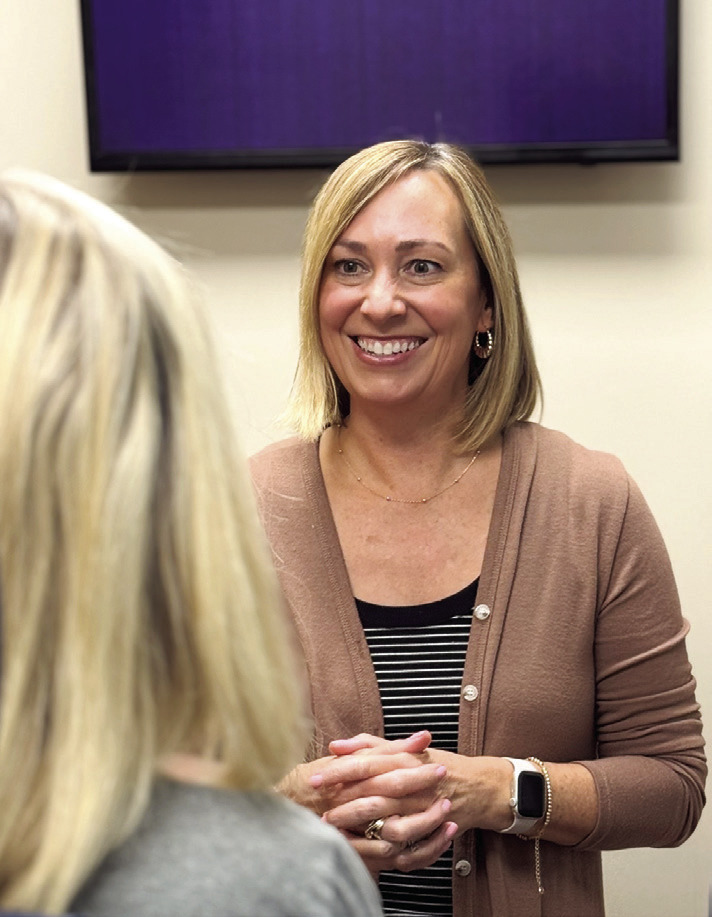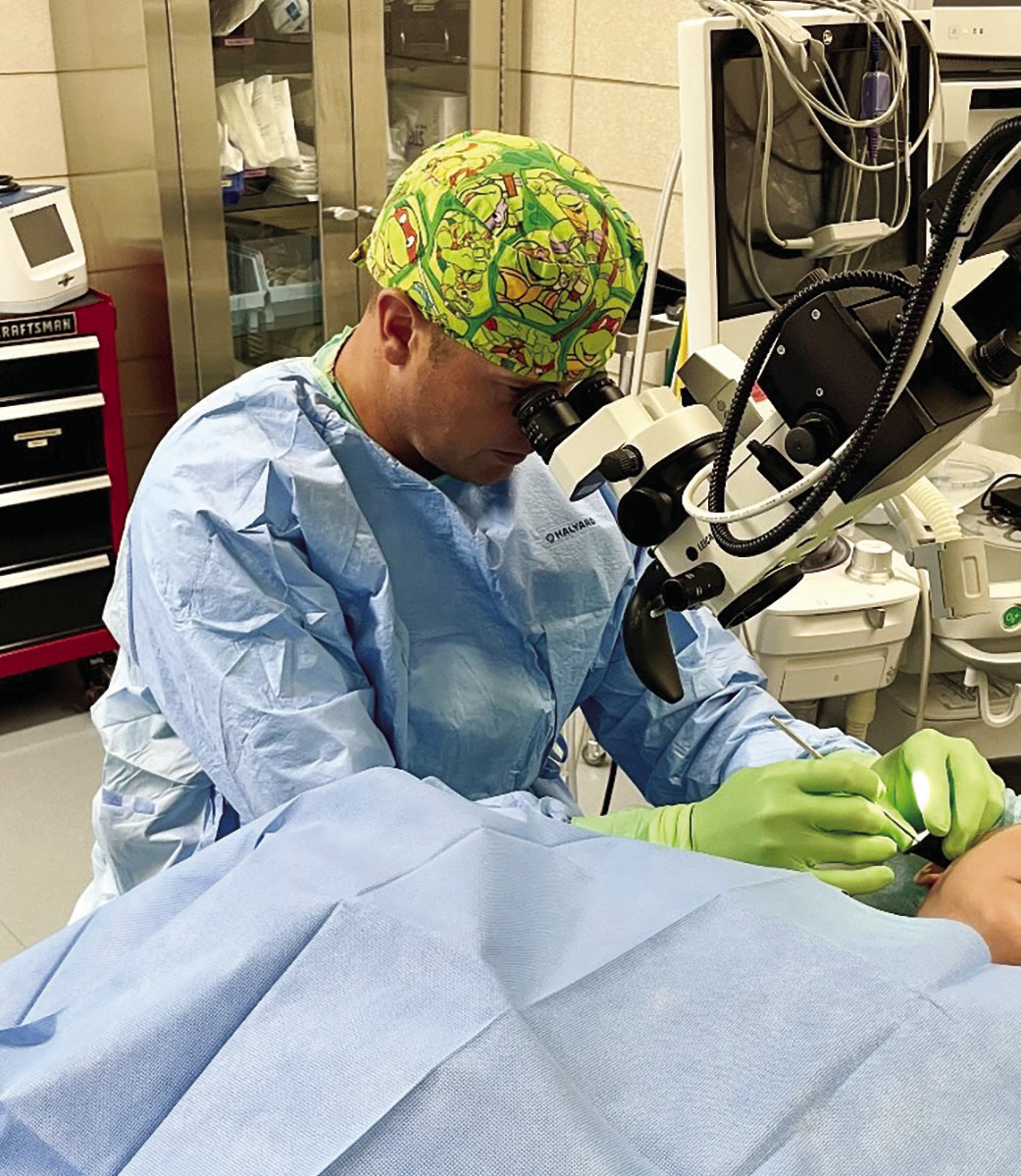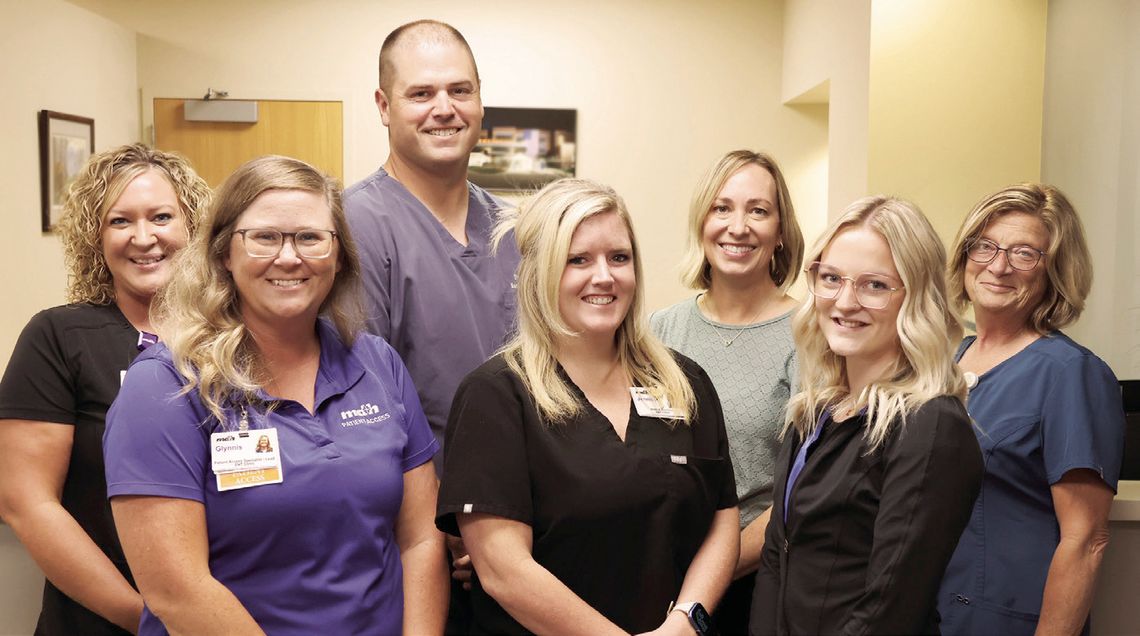Otolaryngology is a seven-syllable word for a medical specialty that can be more easily understood as ear, nose and throat, or ENT for short. Despite that simplified name, ENT physicians treat nearly every medical concern in the neck and head, except the brain, spinal cord and eyes.
“For an ENT, most people think of [ear] tubes and tonsils because they are common surgeries we do in kids,” said Jeffrey Sparks, D.O., who treats patients at MDH Ear, Nose and Throat Clinic. “I think most people don’t understand the extent of what we do.” Dr. Sparks and nurse practitioner Kamie McKee, FNP, have worked together in the ENT clinic since it opened 12 years ago. Their patients range from newborns to 105 years old.
“I like the fact that there are a lot of different ways I can help people in the office and through surgery,” Dr.
Sparks said. “I do everything I can to make their lives better.”
A comprehensive story about everything an ENT physician does would be worthy of a medical journal.
What follows is a brief outline of diagnoses and treatments offered at MDH Ear, Nose and Throat Clinic.
Better breathing and sleeping “A lot of people neglect the nasal airway because you can open your mouth and breathe,” Dr. Sparks said.
“Mouth breathing is not ideal. The nose is a filter. The little nose hairs gather particles so you don’t breathe in so much bacteria into your lungs. It also moistens the air. If your nose is congested and you breathe all night with your mouth, you notice your mouth is really dry and you have a sore throat when you wake up in the morning.”
Nasal airway obstruction can be caused by inflammation, congestion or a deviated septum, a condition in which the cartilage that divides the two nasal chambers shifts from the center.
Dr. Sparks performs several different procedures to improve breathing during the day and night. This includes surgical treatments for chronic obstructive sleep apnea, a condition in which sleep is interrupted throughout the night. Although people with sleep apnea may not realize they are waking briefly, recognizable symptoms are daytime sleepiness, having trouble waking up and reports of snoring and restlessness from sleeping partners.
“There are four areas that can cause obstruction – nose, palate, tongue base or epiglottis.
I use a scope to evaluate where the problem is and may surgically address it, depending on where the problem is,” Dr. Sparks said.
Surgery may eliminate the need for a continuous positive airway pressure (CPAP) machine.
Skin cancer
Because ENTs specialize in problems of the neck and head, they are trained to treat skin cancer in these areas. Having a physician in Macomb who also is trained in facial reconstruction surgery is an added benefit.
“Skin cancer often occurs in sun-exposed areas like the face,” he said. “I do a lot of skin cancer here because there are many farmers and people who spend a lot of time outside. The removal isn’t as tough as the repair.”
He explained that removing skin cancer on the neck involves making a football-shaped incision and then suturing the skin together in a line. The nose and ears are more difficult to repair after cancer removal because there’s no extra skin in the areas.
“You have to know ways where you can borrow skin from [through grafting] to give it a good cosmetic appearance.”
Sinus infection and blockage Nearly 30 million people in the U.S. are diagnosed with sinus infections every year, according to the Centers for Disease Control and Prevention. Although the presence of sinus pressure and pain is easily felt, the purpose of the air-filled cavities in the head is not easily understood.
“A trauma surgeon would say they’re kind of like an airbag for your brain. Any time you get hit in the face, it’s like a trouble zone so your brain is safer,” Dr.
Sparks said. “We don’t know exactly what they do to help us. Inside your sinuses and your nose, you secrete mucus all the time, and that helps the air the you breathe.”
Dr. Sparks said primary care providers can prescribe the same medications he would prescribe for simple sinus infections. But when medications are ineffective, he is trained to perform a variety of procedures to reduce inflammation and open the sinus cavities. Balloon sinuplasty, for example, uses an inflated balloon to dilate blocked openings.
Cancerous and noncancerous growths ENTs diagnose and often remove cancerous and noncancerous masses in the throat and thyroid and salivary glands. Treatment also may include chemotherapy or radiation provided in another clinic.
“I had a patient that was diagnosed with cancer in her throat three years ago,” Dr. Sparks said. “We got her treated and now I continue to check on her to make sure that she doesn’t have recurrence. Last week, I took a look through a scope down her throat. When I told her there was no evidence of cancer, she jumped up and down and screamed because she was so excited that the cancer wasn’t back. Helping people is the rewarding part of my job, for sure. In this case, we were able to help save this lady’s life.”
The man behind the surgical mask Dr. Sparks grew up 100 miles away from Macomb in Kirksville, Missouri.
Although his father is a family physician and his mother was an operating room nurse, he was undecided about a career in medicine until he was attending undergraduate school at Truman State University.
However, he was sure he didn’t want to be a surgeon – until he met one that he wanted to emulate.
“In medical school, I met a surgeon who was an amazing person,” Dr. Sparks said.
“When he walked through the hospital, he knew everybody. He knew everybody’s kids. He talked to everybody and was just a great person.
I then realized it’s not what you do but who you are, and I realized I can do anything I want to do and be anyone I want to be.”
After graduating from medical school at Kirksville College of Osteopathic Medicine, Dr. Sparks was accepted into a general surgery residency at Northeast Regional Medical Center in Kirksville. It included a rotation in ear, nose and throat surgery.
“I just fell in love with it and knew that’s what I wanted to do,” he said. With the required general surgery internship already completed, he easily switched his career path. He is now board-certified in otolaryngology and facial plastic surgery.
Building a practice and a life in Macomb As Dr. Sparks was finishing his residency in 2013, he and wife, who were high school sweethearts, began looking for a community in which to live and establish his medical practice. They knew what they wanted and found it in Macomb.
“We wanted to raise our kids in a town this size – a college town big enough to have some stuff and small enough that we feel safe,” he said. “We looked around to see where there was a need for an ENT and came across Macomb. We came here and interviewed and liked it.”
Dr. Sparks helped establish McDonough District Hospital’s first ENT clinic as Health Services Building 2 was being built.
An outdoorsman, Dr.
Sparks unwinds with “tractor therapy” on his farm in Macomb.
“Most of my farm work is for play,” he said. “I get out there, be by myself and get away from people for a while – just be in nature. It’s fun for me.”
Nurse practitioner chooses ENT
McKee began her career as an aide on the medical- surgical floor at MDH.
While working, she continued her education, first becoming a registered nurse and then a family nurse practitioner. Nurse practitioners perform diagnostic tests, provide nonsurgical treatment and prescribe medication.
As McKee completed her education, she knew she wanted to work in a specialized area of medicine but she hadn’t chosen a field.
“One day, I saw in the employee newsletter that an ENT clinic was being planned and it just clicked,” she said. “I thought, ‘I hope they want a nurse practitioner.’” More than a decade later, McKee remains enthusiastic about her career. She performs many procedures in the clinic five days a week. This includes conducting skin cancer biopsies, examining patients to determine reasons for hearing loss, treating chronic ear and throat problems, administering environmental allergy tests and immunotherapy injections and providing cosmetic Botox injections, “That’s what attracts me to ENT,” McKee said. “It’s a lot of different things but still a specialty. People are surprised by the number of things treated in our clinic.
I want people to know they can be taken care of in Macomb instead of going out of town.”
How to become a patient
The ENT clinic accepts patients without a referral from a primary care provider. However, referral may be required by patients’ insurance companies. For more information or to make an appointment, call 309-833-6937.











